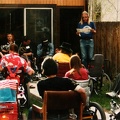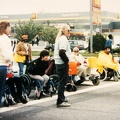[Headline] Champion of disabled, son drown
By Judith Brimberg
Denver Post Staff Writer
Wade Blank, a Denver resident who use civil-rights tactics to win accessible transportation for the handicapped, has died in a swimming accident in Mexico that also claimed the life of his 8-year-old son, Lincoln.
The 52-year-old onetime Presbyterian minister had been vacationing with his family in Todos Santos at the tip of the Baja California peninsula when tragedy struck Monday morning, an associate said. Lincoln was caught in a Pacific Ocean undertow and when Blank went to the child's rescue, he too was sucked under.
Blank's body had been recovered, but Lincoln's still was missing as of last night.
A Denver resident since 1971, the able-bodied Blank was the spark plug for handicapped activism locally and elsewhere. Recognized by his blond hair worn long the style of the 1960s, the tall, lanky advocate was the driving force behind numerous demonstrations.
He led protests in federal buildings and downtown Denver streets to advance independent living for the disabled; in Washington, D.C., to obtain passage of the landmark Americans with Disabilities Act; and throughout the nation to liberate the disabled from nursing homes.
"He is the one who cut the path through [text cuts off]
[image]
[image caption] Blank family: Left to right, Caitlin Blank, Wade Blank, Lincoln Blank, and Mollie Blank in a picture taken July 26, 1992. Wade and Lincoln died Monday in a swimming accident in Mexico. Special to The Denver Post. Tom Olin.
[text resumes] the jungle to provide opportunity for the disabled and to educate the broader community about their rights," said U.S. Transportation Secretary Federico Pena, who first met Blank in 1982 when Pena ran for Denver mayor.
Blank asked Pena whether he would drop charges if the handicapped were arrested for civil disobedience. When Pena hedged, Blank told him: "That's the wrong answer. We want to be treated like everybody else. Don't give us any break."
A native of Pittsburgh, Blank received a divinity degree from McCormick Seminary in Chicago. In the late 1960s, he was pastor of a Presbyterian Church in Akron, Ohio, and was involved in the anti-war movement at Kent State University.
Admittedly burned out when he came to Denver, Blank worked in the youth wing of a nursing home before helping launch the Atlantis Community for the disabled in 1975.
"I decided to move people out of the nursing home and do the care myself," Blank recalled in a recent interview. "You try moving eight people who are severely disabled into their own apartments and be responsible for dressing them, feeding them, bowel programs, bathing them. I think if I were sane, I probably wouldn't have done it, but within the first six months, I'd moved 18 people out. So now I was wedded to the concept."
Atlantis today has about 100 disabled people who receive attendant services.
From there, it was an easy step to civil rights activism. On July 5, 1978, under Blank's tutelage, 19 handicapped people in wheelchairs blocked two RTD buses for 24 hours to force public accommodations to be made accessible to people in wheelchairs. It was the start of a campaign that tasted victory in 1983 when RTD's first elected board rescinded an earlier action and voted to make 89 new RTD buses handicapped accessible.
"That was major turning point in the way RTD responded to Blank's efforts," recalled former RTD Chairman Jack McCroskey.
That same year, Blank and his cohorts formed a new umbrella organization--American Disabled for Accessible Public Transportation--ADAPT--and began picketing meetings of the American Public Transportation Association.
In 1990, to spur passage of ADA legislation, ADAPT organized a massive demonstration capped by 200 handicapped people crawling up the steps of the Capitol building to block the rotunda.
"I do not think that was an extreme action," said Justin Dart Jr., chairman of the President's Committee on Employment of the Handicapped. "Homeless people with disabilities were dying in the streets or were incarcerated in nursing homes or institutions without due process of law."
Saddened by Blank's death, Dart said: "I don't think the ADA would have passed as a civil rights law without him."
Recently, ADAPT has taken a new name, American Disabled for Attendant Programs Today, and has a new goal, that of making home health care a right so the disabled can live in their own homes.
Despite his successes, Blank never collected more than $18,000 a year in salary.
"Wade was one of those people you saw going on forever," said Mike Auberger, a paraplegic who is co-director of the Atlantis Community.
"He was 52, but he was 18 years old as far as energy and drive were concerned. He kicked us into a whole other gear. He was a real center for the disabled community and a real focus of where disability rights needed to go."
Blank is survived by his wife, Mollie; two daughters, Heather a 22-year0old handicapped woman whom he adopted 12 years ago, and Caitlin, 6; his mother Ruth, of Canton, Ohio, and two sisters. Funeral arrangements are pending.
- Krouet d'an
- ar Merc'her 24 a viz Gouere 2013
- Ouzhpennet d'an
- ar Merc'her 9 a viz Here 2019
- Gweladennoù
- 227
- Skor
- Notenn ebet
- Reiñ un notenn d'al luc'hskeudenn-se


0 evezhiadenn